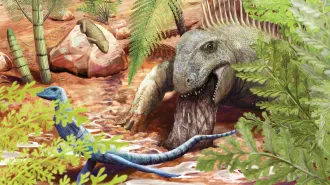Life
Danger moths get the girls, plus hibernating rabies and duck personalities in this week’s news
Trading off danger for girls
Wood tiger moths with white wings are more likely to get eaten, but also more likely to get lucky. The moths taste terrible and depend on bright wing colors to warn off predators like birds. In Europe, male wood tiger moths flaunt mostly white or yellow on their hind wings, but tests show that white doesn’t deter wild birds as effectively as yellow does. Evolutionary forces might be expected to purge genes for reckless white — except that tests also show white boosts a male’s chances of mating, an international team reports online June 8 in the Proceedings of the Royal Society B. —Susan Milius
Hibernation perpetuates bat rabies
Bats’ long winter hibernation may help keep rabies infections circulating in their populations, Colorado State University researchers and their colleagues suggest online June 6 in the Proceedings of the National Academy of Sciences. Infected bats can serve as a natural reservoir of the disease, and biologists have proposed that slowing metabolic processes during hibernation helps keep infected bats alive through the winter. A five-year study of big brown bats in Colorado has now allowed researchers to mathematically test ideas about rabies persistence, and the team finds that a hibernation effect would indeed keep infections simmering by letting older animals pass along rabies to the next generation in the spring. —Susan Milius
Developing duck personalities
Tests now suggest that early challenges to a duckling’s immune system can influence a mallard’s later personality. Biologists have been finding plenty of personality, meaning consistent individual differences in behavior, in a wide range of animals. Studies of rodents have suggested that while young brains are developing, exposure to pathogens boosts lifelong tendencies to explore or frisk around. Immune challenges for ducklings likewise increase exploration and activity levels later, but the timing of exposure is important, researchers in the United States and Norway report online June 8 in the Proceedings of the Royal Society B. —Susan Milius







